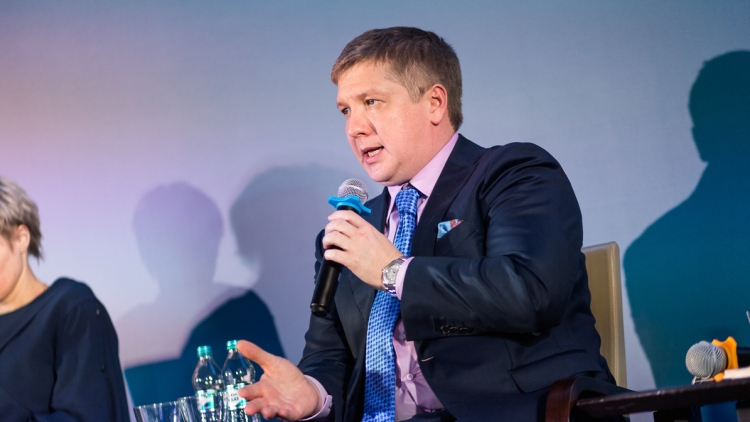
Andriy Kobolyev: Gazprom will pay for its deeds
What is your best-case scenario for Naftogaz’s operations with Gazprom after 2019?
Let’s be frank about this. It’s going to be very hard to maintain our transit operations after 2019, once Nord Stream II is on line. Every cubic meter of transit gas that remains in the system will have to be gained in battle: incredible diplomatic skills, our own work, and the efforts of the government and the president personally.
There is still the off chance that Nord Stream II can be stopped. Right now, the challenge for the Ukrainian side is to show Ukraine’s international partners all the threats that this project represents. This should make it possible to gain powerful support in countering the construction of this pipeline.
If Gazprom’s actions lead to gas transit through Ukraine being terminated, Naftogaz will go to international arbitration to make Gazprom pay for its deeds.
Since Naftogaz intends to sue Gazprom for US $12 billion in damages for the possible loss of transit through Ukraine, what is the legal basis for this kind of suit?
We have launched a new arbitration case in Stockholm. Naftogaz’s claims include compensation for damages from Gazprom for not fulfilling its gas supply contract with us. This compensation is the difference between the revised contract price, based on the new formula determined by the previous arbitration panel, and the cost incurred by Naftogaz to substitute Gazprom gas with deliveries from Europe. The total amount of claims is actually already more than US $12bn.
As to the legal arguments, we are basing them on the provisions of the current transit contract, which allows Naftogaz to revise transit rates to reflect the accelerated amortization and/or commercial depreciation of Ukraine’s GTS due to the lack of transit after 2020. Our claims are quite solid. So the only real way for Gazprom to avoid being penalized is to abandon Nord Stream II. Only this would provide some assurance that transit through Ukraine will continue.
Given that our European partners tend to be highly pragmatic, how might they be persuaded that maintaining transit through Ukraine will be more commercially viable for EU countries than transporting it through Nord Stream II?
There is no economic basis for building Nord Stream II. Even if Germany doubles its purchases of gas, Ukraine’s GTS can easily deliver the additional volume at a much better rate. We have been pointing out by every means possible to our European partners that Nord Stream II is a purely political project that threatens the European Union’s energy and environmental security.
How is the process of unbundling the GTS operator going? What obstacles are there?
We’re committed to unbundling, in line with the Law “On the natural gas market” as part of implementing the Third Energy Package. So, we are persistently working at unbundling and have made this one of our strategic objectives. In terms of the Naftogaz Group and with the Supervisory Board’s coordination, we are taking all the necessary steps that are within our purview to prepare for the unbundling.
But there are two very important aspects that have inevitably slowed down the process. First, there is the situation with Gazprom. The transit contract between Naftogaz and Russia’s Gazprom does not allow for rights and obligations under the contract to be transferred to third parties without the approval of the other party, in this case, Gazprom. It also designates Naftogaz as the provider of services under a contract that, among others, ensures the operation of Ukraine’s GTS. Unbundling is precisely the transfer of rights and obligations connected to the transport of natural gas to a new company designated by the government that meets a clear list of criteria for being independent. Gazprom President Alexei Miller has made his position clear: the contract cannot be revisited. This already means that unbundling cannot be completed until the current contract with Gazprom expires in 2019.
The second point is that unbundling, in and of itself, is not the goal. The goal is to ensure the operation and development of Ukraine’s GTS on a European model and maintaining Ukraine’s strategic transit role. This means that the terms of the unbundling need to be understandable, acceptable and convenient for potential strategic partners who will co-manage the system. Their involvement in the enterprise that will be set up after unbundling will be the main insurance that transit will continue, that Ukraine’s GTS will continue to grow, that there will be effective communication with the EU, and that the company’s interests will be protected in the face of Russia’s aggression.
How financially stable is the GTS operator, given the huge debts incurred by oblast gas operators for unsanctioned siphoning of gas from the system?
The accumulated debt is already UAH 27.5bn [about US $1 billion]. Nearly 70% of that debt belongs to gas distribution operators in the RGC group’s network. For the last three years, the operators in this network have claimed that the low distribution rate is justification for siphoning gas from the AT Ukrtransgaz network for their own technical use. AT Ukrtransgaz, on the other hand, pays from its own pocket for the siphoned gas, and so it has accumulated losses. This imbalance has led to considerable financial instability for the GTS operator.
In fact, this could lead to considerable complication in attracting an international partner to manage the Ukrainian GTS after unbundling. No one wants to be responsible for a gas transport system that allows oblasts utilities to siphon off gas without any controls.
